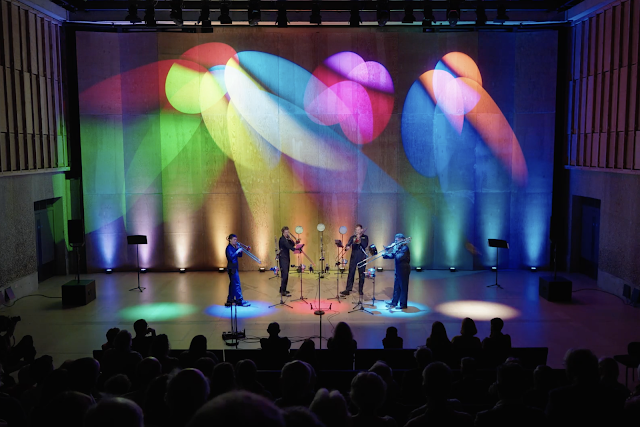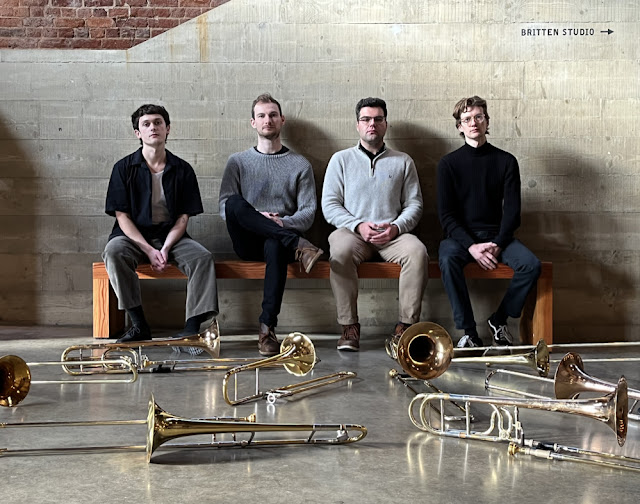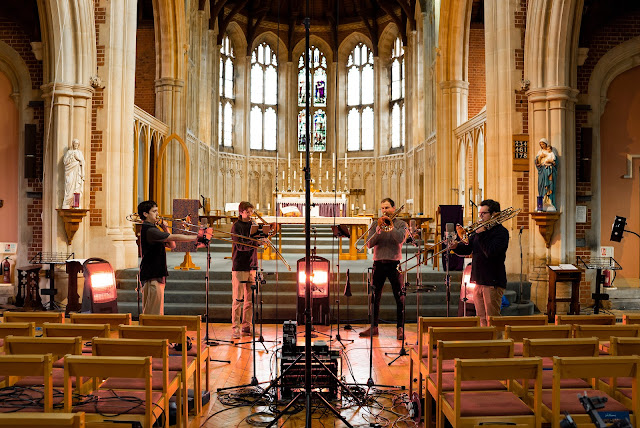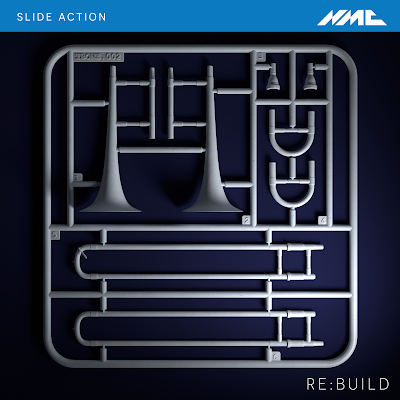 |
| Slide Action (Photo: Matt Jolly) |
Formed in 2018, the trombone quartet Slide Action (Huw Evans, Jamie Tweed, Benny Vernon and Josh Cirtina) has just released its first major album, their debut recital disc. On NMC Recordings the album, RE:BUILD features music by contemporary composers Ryan Latimer, Laura Jurd, Emily Hall, Alex Paxton and Joanna Ward. The quartet is passionate about creating a new voice for the trombone and they regularly commission new music from composers, collaborate with other musicians and create their own arrangements.
In 2021-22 Slide Action were Britten Pears Young Artists, where they collaborated with numerous emerging and established composers. Highlights included the premiere of Robin Haigh’s concerto for four trombones and orchestra – THE DREAMERS, written for Slide Action and the Britten Pears Contemporary Ensemble, and Slide Action’s own show Rebuilding the Trombone featuring eight new works.
I recently met up, by Zoom, with Josh and Jamie from the ensemble to find out more about the new disc and about their approach to creating music for trombone quartet. They regard new music as the ensemble’s USP, commenting that when they started in 2018 there was not a huge amount of new music for trombone quartet, much of it was not that interesting and a lot of the new music came out of the Paris Conservatoire in the 1950s and 1960s. They wanted to grow the repertoire by commissioning new pieces and creating their own material (the new disc includes Josh’s arrangements of music by Purcell and Matthew Locke, and pieces by Jamie and Benny). They are also interested in discovering new sounds for the instrument.
Josh and Jamie admitted that, outside of the trombone world, the trombone quartet is still viewed as something strange but for them, it was quite natural. They have been playing in trombone quartets all their playing lives and wanted to present the repertoire to a wider world. The music on the disc is a reflection of their live programming, both the programme order and the new commissions. The disc features new pieces alongside what the quartet calls Interludes. Four commissions and one Interlude were premiered at a concert at Aldeburgh in 2022, and to these were added a further commission and further Interludes. Originally, the programme was a live concept but their aim was always to make an album.
 |
| Slide Action at Snape Maltings (Photo courtesy of Britten Pears Arts) |
They did not simply want the programme to be a selection of new music; they felt that if it was, they would struggle to make people want to listen to the album. Their concept was for a unified listening experience, creating Interludes which are inspired by the pieces that come before and after. So, particular pitches or thematic links are used to draw things together and present a single arc for the listener.
When I asked about the long wait from their founding to creating their debut recital disc, the two men laughed and admitted that it was partly to do with money. But also, all the new pieces took time for the collaborations with the composers to develop and to get the finished music under their skins. Also, the group took time to find its feet. When they were first formed, they played a lot of the classical trombone repertoire and vocal music. They had the idea for the programme and the album, but it took time to come to fruition. And it wasn’t just a case of raising the money for the recording, getting the backing of a label like NMC was important to have their project taken seriously. They find that there is still a difficulty with getting the trombone to be taken seriously, particularly in new music.
In fact, one of the best ways to learn the trombone is to play with other trombonists; who better understands your trombone playing than other players? After all the idea of trombones playing together (and before them, sackbuts) is a very old idea. Transcriptions of choral music were their bread and butter, the four forming an ensemble like ATTB. Though this sort of ensemble was a feature during the Early Music period, it is strange how little for it developed subsequently.
There are strong preconceptions about the instrument. The ensemble wants to encourage people with less experience with the trombone, particularly composers, to find out more, and they are producing a series of videos demystifying the trombone. Their approach is matter-of-fact, for instance with glissandos they explain what does and does not work on the instrument. They want to encourage composers to use new sounds rather than sticking to the basic pitches. And whilst composers are not actually discouraged from looking into the trombone, the instrument is unusual even amongst other brass instruments. They want to demystify things and break things down in a way that does not come across well in a book. For instance, in the varieties and uses of mutes, and here they mention the way contemporary composers have been experimenting with putting things other than mutes down the bell of the instrument. Hence the importance of the videos [see the ensemble’s website].
For the album, they gave all the composers the same brief. They wanted music that projected the composer’s voice unadulterated and wanted the composers to think about new sounds for the trombone. Except for Alex Paxton (who is a trombonist), they tried to find composers who had not written much for trombone and who were not well-known in the brass world.
 |
| Slide Action – February 2024 (Photo: Ollie Denton ) |
Outside of the ensemble, the four have varied and wide-ranging careers
though all are classically trained. When we spoke Josh had been playing
with the Royal Philharmonic Orchestra whilst Jamie was on tour with the band, Public Service Broadcasting (and was taking the Zoom call from the tour
bus) and had recently been on a cruise. They all have portfolio careers,
their other activities being complementary to their work in the
quartet. All four find it helpful to have multiple irons in the fire,
and Jamie admits that they would struggle if restricted to playing
Beethoven’s Symphony No. 5 and Prokofiev’s Symphony No. 3 all the time,
wonderful though those pieces are.
The sheer variety of their
careers means that they are comfortable in different scenarios which
helps with the quartet, their performance is an amalgam of their
personalities and careers. Thus they are something of a creative melting
pot, bringing new ideas into the performance and new thoughts about
venue choices beyond the standard classical, as well as having the
experience of diverse styles of music. They admit that the main downside
to this diversity is the challenge of timetabling.
What they
want to achieve is to leave a legacy of music for the trombone and
trombone quartet, and bring the trombone to a wider audience. They are about to announce their 2025 programme which will have a focus
on collaborations, with different composer-performers and with the
mezzo-soprano Lotte Betts Dean. They have another album in their sights
which might be thought of as Slide Action and friends, with
cross-collaborations across instruments, genres and sound worlds. This
would be exciting in itself, but they also feel that these varied
collaborations will have an appeal for different promoters and
audiences. They want to go beyond the idea of just four guys and their
trombones. Whilst they were on the Britten Pears Young Artist Programme
they were encouraged to work with other composers and performers, and
given time and space to do so, and are keen to continue in this vein.
RE:BUILD – Slide Action (Huw Evans, Jamie Tweed, Benny Vernon and Josh Cirtina) – NMC Recordings
- Henry Purcell (arr. Josh Cirtina): ‘March’ from Music for the Funeral of Queen Mary, Z. 860
- Ryan Latimer: C. Exigua
- Jamie Tweed: INTERLUDE I — Smooth Place Cool Drink
- Laura Jurd: Swamped
- Benny Vernon: INTERLUDE II — Sit
- Emily Hall: Close Palms
- Matthew Locke (arr. Josh Cirtina): INTERLUDE III — Flatt Consort
- Alex Paxton: Hairy Pony Estampie
- Joanna Ward: Playing frisbee May 2022
The blog is free, but I’d be delighted if you were to show your appreciation by buying me a coffee.
Elsewhere on this blog
- Character, charm & 60s vibe: Britten’s A Midsummer Night’s Dream at Opera North – opera review
- Attention to detail & sheer energy: Haydndyah from Lars Ulrik Mortensen & Concerto Copenhagen on Berlin Classics – record review
- Over-arching themes and influences: Andrew Ford’s The Shortest History of Music – book review
- Inventive and imaginative: Olivia Fuchs’ successfully reinvents Rimsky Korsakov’s The Snowmaiden for English Touring Opera – opera review
- Portraits of a troubled family: Bernstein’s Trouble in Tahiti & A Quiet Place at the Royal Opera House – opera review
- Leading with a love that inspires: Tafelmusik has a new collaboration with violinist Rachel Podger & a new disc of Haydn symphonies – interview
- A themed programme with an imaginative difference: Music from Pole to Pole with City of London Sinfonia and atmospheric physicist Dr Simon Clark – concert review
- Sound magic: En Couleur from the percussion group, Trio Colores – record review
- From expressionist nightmare to radiant energy: Schoenberg’s Pierrot Lunaire & Schubert’s String Quintet at Hatfield – concert review
- Charpentier’s Actéon & Rameau’s Pygmalion: a perfect double-bill offering a delightful, entertaining evening – opera review
- Home


.png?w=998&resize=998,665&ssl=1)




%20Craig%20Fuller.jpg?w=160&resize=160,160&ssl=1)

